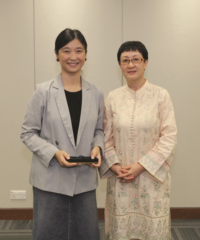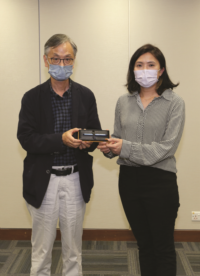The first seminar “On the Stringless String the Sound Lacks a Sound: Tracing the Image of the Stringless
Qin in Buddhist and Literati Writings During the Song Dynasty (960–1279)” was delivered by Dr. Meimei Zhang from Occidental College on 25 October 2022.
Dr. Zhang is an Assistant Professor in the Department of Comparative Studies in Language and Culture at Occidental College. Her research interests are Premodern Chinese Literature, Music, and Intellectual History during China’s Tang-Song Transition Period, specialised in the Chinese musical instrument, qin.
During the lecture, Dr Zhang shareed her research of the “stringless qin” in Buddhist and literati writings. The symbol of the stringless qin is often related to Tao Qian, who would play on a qin without strings while he was drunk. A qin without any strings cannot make any sound, thus, this action is usually recognised as using music that does not exist as a way to practice the way of Zen, especially the teaching of “Not based on the written word, directly pointing to the human mind” (不立文字,直指人心). Since Song Dynasty heavily emphasised Buddhist teachings, the stringless qin as became a symbol among monks and scholars, who treated it as a token of enlightenment, a way to liberate people from burdens. literati writings that contain both religious and philosophical discussions, on one’s self reflection and improvement, on the remembrance of Tao Qian himself, and ultimately, on pursuing virtue and morals.
The second seminar “No More Miss Nanyang: New Women Monthly and Chinese Women’s Writings in Postwar Malaya” was delivered by Dr. Show Ying Xin from Australian National University on 15 November 2022.
Dr. Show is a Lecturer in the Department of Gender, Media and Cultural Studies, School of Culture, History & Language. Her Research interests include Southeast Asian history and literature, Inter-Asia cultural studies, Chinese and Sinophone literature, Chinese diaspora, translation, and memory.
The lecture focused on Malaya in the period of 1945–1948. During that time, females had low social status. They could not receive proper education and jobs, and most of them were destined to be either housewives or prostitutes for the rest of their lives. Until “Malaya’s Spring” took place, people were introduced to concepts of freedom and equality, and at the same time, intellectuals from China brought along their books and thoughts to Malaya. Females started to realise that they can unite and rise up against discrimination and injustice imposed on them by a patriarchal society.
With the help of Chinese scholars, magazines that target female audiences, such as “New Women Monthly” were being published. Everyone was striving to be a “new woman”, an ideal image of an independent strong woman, with sufficient financial and intellectual assets to stand against male dominance. Unfortunately, the movement came to an early end due to restrictions from the government and disagreement among the feminists. Nevertheless, it was still a milestone for the feminist movement in Malaya. |


















